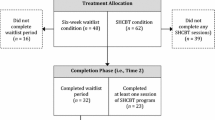Abstract
Relapse rates among pathological gamblers are high with as many as 75% of gamblers returning to gambling shortly after a serious attempt to quit. The present study focused on providing a low cost, easy to access relapse prevention program to such individuals. Based on information collected in our ongoing study of the process of relapse, a series of relapse prevention booklets were developed and evaluated. Individuals who had recently quit gambling (N = 169) were recruited (through media announcements) and randomly assigned to a single mailing condition in which they received one booklet summarizing all of the relapse prevention information or a repeated mailing condition in which they received the summary booklet plus 7 additional booklets mailed to them at regular intervals over the course of a year period. Gambling involvement over the course of the 12-month follow-up period, confirmed by family or friends, was compared between the two groups. Results indicated that participants receiving the repeated mailings were more likely to meet their goal, but they did not differ from participants receiving the single mailing in frequency of gambling or extent of gambling losses. The results of this project suggest that providing extended relapse prevention bibliotherapy to problem gamblers does not improve outcome. However, providing the overview booklet may be a low cost, easy to access alternative for individuals who have quit gambling.
Similar content being viewed by others
References
Brandon, T. H., Collins, B. N., Juliano, L. M., & Leavey, S. B. (2000). Preventing relapse among former smokers: A comparison of minimal interventions through telephone and mail. Journal of Consulting and Clinical Psychology, 68, 103–113.
Cicchetti, D. V. (1994). Guidelines, criteria, and rules of thumb for evaluating normed and standardized assessment instruments in psychology. Psychological Assessment, 6, 284–290.
Crockford, D. N., & el-Guebaly, N. (1998). Psychiatric comorbidity in pathological gambling: A critical review. Canadian Journal of Psychiatry, 43, 43–50.
Gerstein, D., Murphy, S., Toce, M., Hoffman, J., Palmer, A., Johnson, R. et al. (1999). Gambling impact and behaviour study: Report of the national gambling impact study commission.
Hodgins D. C. (2004). Workbooks for individuals with gambling problems: Promoting the Natural recovery process through brief intervention. In L’Abate L. (Ed.), Using workbooks in mental health: Resources in prevention, psychotherapy, and rehabilitation for clinicians and researchers (pp. 159–172). Binghamton, NY: The Haworth Reference Press.
Hodgins, D. C., Currie, S. R., el-Guebaly, N., & Peden, N. (2004). Brief motivational treatment for problem gambling: 24 month follow-up. Psychology of Addictive Behaviors, 18, 293–296.
Hodgins, D. C., Currie, S. R., & el-Guebaly, N. (2001). Motivational enhancement and self-help treatments for problem gambling. Journal of Consulting and Clinical Psychology, 69, 50–57.
Hodgins, D. C., & el-Guebaly, N. (2000). Natural and treatment-assisted recovery from gambling problems: A comparison of resolved and active gamblers. Addiction, 95, 777–789.
Hodgins, D. C., & el-Guebaly, N. (2004). Retrospective and prospective reports of precipitants to relapse in pathological gambling. Journal of Consulting and Clinical Psychology, 72, 72–80.
Hodgins, D. C., & Makarchuk, K. (2003). Trusting problem gamblers: Reliability and validity of self-reported gambling behavior. Psychology of Addictive Behaviors, 17, 244–248.
Hodgins, D. C., Peden, N., & Cassidy, E. (2005). The association between comorbidity and outcome in pathological gambling: A prospective follow-up of recent quitters. Journal of Gambling Studies, 21, 255–271.
Hodgins, D. C., Peden, N., & Makarchuk, K. (2004). Self-efficacy in Pathological Gambling Treatment Outcome: Development of a Gambling Abstinence Self-efficacy Scale (GASS). International Gambling Studies, 4, 99–108.
Hodgins, D. C., & Petry N. M. (2004). Cognitive and behavioral treatments. In J. E. Grant, & M. N. Potenza (Eds.), Pathological gambling. A clinical guide to treatment (pp. 169–188). New York: American Psychiatric Association Press.
Hodgins, D. C., Wynne, H., & Makarchuk, K. (1999). Pathways to recovery from gambling problems: Follow-up from a general population survey. Journal of Gambling Studies, 15, 93–104.
Lesieur, H. R., & Blume, S. B. (1987). The South Oaks Gambling Screen (SOGS): A new instrument for the identification of pathological gamblers. American Journal of Psychiatry, 144, 1184–1188.
McCown, W. G., & Chamberlain, L. L. (2000). Best possible odds. contemporary treatment strategies for gambling disorders. New York: John Wiley and Sons.
Petry, N. M. (2005). Pathological gambling. Etiology, comorbidity, and treatment. Washington, D.C.: American Psychological Association.
Radloff, L. H. (1977). The CES-D scale: A self-report depression scale for research in the general population. Applied Psychological Measurement, 1, 385–401.
Sanchez-Craig, M., Davila, R., & Cooper, G. (1996). A self-help approach for high risk drinking: Effect of an initial assessment. Journal of Consulting and Clinical Psychology, 64, 694–700.
Sylvain, C., Ladouceur, R., & Boisvert, J. (1997). Cognitive and behavioral treatment of pathological gambling: a controlled study. Journal of Consulting and Clinical Psychology, 65, 727–732.
Taylor, S., & Bogdan, R. (1984). Introduction to qualitative research methods: The search for meanings (2nd ed.). New York: Wiley.
Acknowledgements
This project was made possible with funding support from the Alberta Gaming Research Institute. We would like to thank Nicole Peden, Karyn Makarchuk, and Susan Green for working with us to write the workbooks. Nicole Peden and Erin Cassidy were responsible for data collection. Finally, we would like to thank the participants who gave freely of their time despite the struggles they were facing.
Author information
Authors and Affiliations
Corresponding author
Rights and permissions
About this article
Cite this article
Hodgins, D.C., Currie, S.R., el-Guebaly, N. et al. Does Providing Extended Relapse Prevention Bibliotherapy to Problem Gamblers Improve Outcome?. J Gambl Stud 23, 41–54 (2007). https://doi.org/10.1007/s10899-006-9045-1
Published:
Issue Date:
DOI: https://doi.org/10.1007/s10899-006-9045-1




